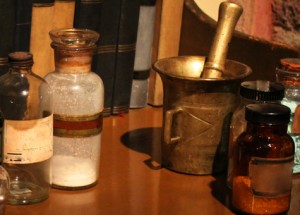Medieval Cures and Hospital Superbugs: A Potent Solution?
 Antibiotic resistance. Over the last few years, the term has been popping up more and more frequently in healthcare news stories; hospitals especially are finding it difficult to fight back against new “superbugs” and drug-resistant bacteria infecting their operating rooms and equipment.
Antibiotic resistance. Over the last few years, the term has been popping up more and more frequently in healthcare news stories; hospitals especially are finding it difficult to fight back against new “superbugs” and drug-resistant bacteria infecting their operating rooms and equipment.
Now, researchers at the University of Nottingham and Texas Tech University may have uncovered a medieval cure to this modern malady. Is this the new superweapon in the fight against evolving hospital bacteria?
The New Risk
According to the World Health Organization (WHO), no region in the world is prepared for the threat of antibiotic resistance. The problem has emerged in large part thanks to the sheer number and type of antibiotics in use; bacteria have evolved to fend off all but the most potent medical concoctions.
Consider methicillin-resistant staphylococcus aureus (MRSA), which causes a number of serious infections and is almost impossible to treat. Hospitals offer an ideal environment for this bacteria to flourish, and many are now searching for non-drug options to reduce the spread. For example, VA hospitals in Oregon now perform MRSA screenings whenever a patient is admitted, moved or discharged. As a result, infection rates have plummeted.
Then there’s the work of the Nottingham and Texas Tech teams, which decided to measure the impact of a medieval “potion” on MSRA. Found in a text called Bald’s Leechbook the potion called for garlic, leek, onion, honey, and bile from the digestive system of a slaughtered cow. Detailed instructions on preparation were also included; when tested, the potion killed 90 percent of MRSA on bacterial culture plates. While this is less than the 99.99 percent preferred by the FDA, it’s much higher than even last-ditch drugs like vancomycin, which the research team said did “essentially, nothing.”
There’s no definitive answer yet on why the potion works—but it’s likely that MRSA and other bugs of this type no longer need resistance to this kind of mixture, since high-powered antibiotics are the current weapon of choice. And who knows? Perhaps modern hospitals will someday resemble medieval alchemy labs.
Other Options
While there’s real promise in ancient cures, these remedies won’t be available at pharmacies and in hospital dispensaries until they’ve been thoroughly tested, analyzed an understood. In other words, don’t expect them anytime soon. But with MRSA and other bugs now attacking elementary schools and other vulnerable centers, medical professionals need a way to fight back.
In addition to currently-available antibiotics which still have some impact against MRSA, hospitals can take steps to limit the spread of these infections. This starts with strategies like those in Oregon, but must also extend to regular and through facility maintenance; for example, heavy-duty vapor steam cleaning can help ensure that nothing leaves an operating theater or recovery room that poses a risk to other patients.
Modern medicine may get a helping hand from ancient practitioners—in the meantime, however, hospitals must do everything in their power to stave off the risk of total antibiotic resistance.
Next Steps:
- Subscribe to our blog to stay informed about the latest HVAC news and insight.
- Stay up to date on facility maintenance tools such as chiller tube cleaners, boiler tube cleaners, hose/pipe cleaners, descaler systems, industrial vacuums, commercial pressure washers, and drain cleaners.

